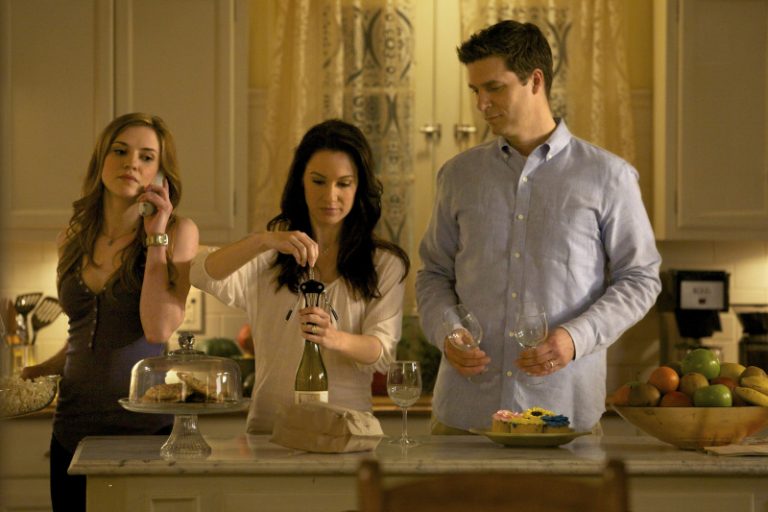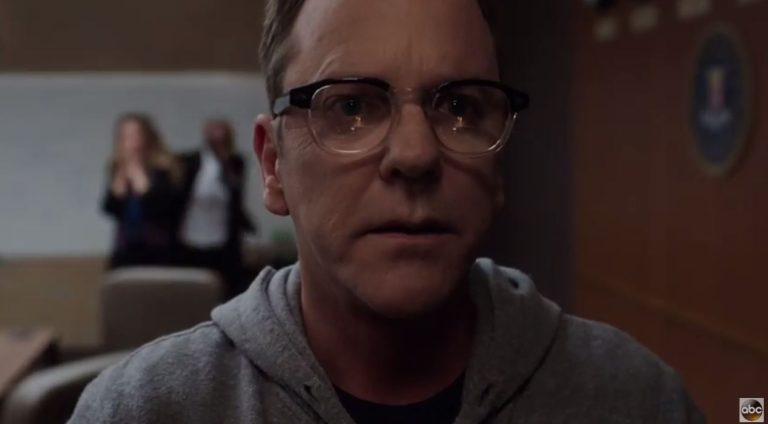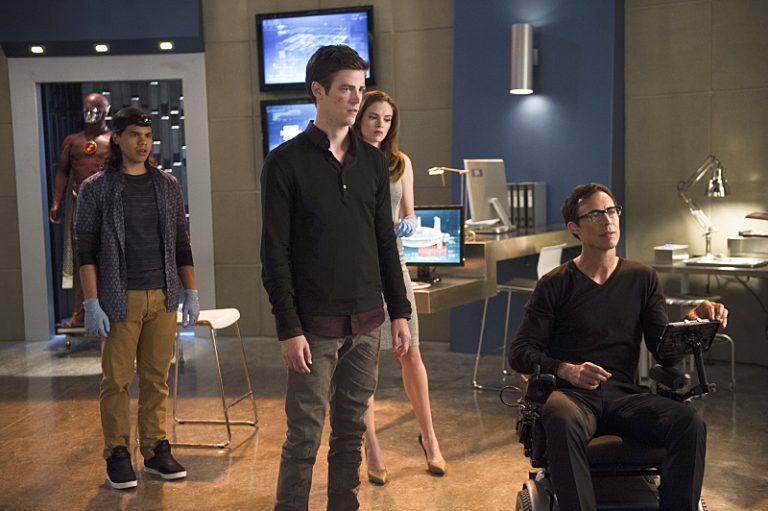
Bates Motel slowed its frenetic-paced season with “Refraction” (written by Erica Lipez), taking some time to look at where each of our characters now stand, and setting the stage for the inevitable trouble yet to come. Norma had an episode or two’s worth of happiness, but that all seems to be over now. Even Norman’s moment of clarity in 4.4 appears to be for naught, as he was back to hallucinating his mother’s presence and taking on her persona once more after another blackout. Ultimately, any hope that came from “Light of Winter” slowly disintegrated with 4.5, illustrating that hope though we might, nothing good is coming for these complex, fascinating characters we’ve come to love.
The episode opens with Norma and Romero cleaning up from the break-in, and Norma wondering aloud if it could be Bob Paris’ doing. Alex tells her it’s most likely payback from somebody in the drug trade, angry because Romero assisted the DEA in breaking up the town’s main business. Of course he knows the truth, that it was Rebecca searching for that damn key, and he quickly pays a visit to his old flame and tells her to leave him and Norma alone. Later, we see part of what is fueling Rebecca’s actions is that she can’t accept that Romero is married, but she also wants to aovid prison for laundering Paris’ money. Rebecca is very uninteresting, and this show’s side stories have often fallen short, but there is likely more to this plot than meets the eye.
Norma goes to town to seek help in repairing her favorite stained glass window that was broken when her house was ransacked, but she isn’t alone. Chick comes back on the scene and follows Norma into the store, where he overhears her giving the cashier her address. He later pays Norma a visit, and we learn that in addition to being a gun runner and drug trafficker, he’s also an artist who can create elaborate stained glass window designs. Of course it’s a convenient plot device, but Chick has been such an usual character, that it’s plausible to think he has other talents that haven’t been put to use as a criminal. Somewhere along the line, Chick chose his life, but the writers are telling us he could have been so much more.
After initially deceiving Norma about his terrible injuries and acting like it’s just a coincidence that he knows Dylan and Caleb, Chick goes to the Bates House and finally comes clean so he won’t be “out of integrity” with himself. He’s also figured out Norma and Caleb’s past (largely due to Norma’s unknowing remark that Caleb is her brother), and outright tells Norma his plans to track Caleb down – with Norma’s help. Norma’s reaction to the news that Chick wants to do Caleb harm speaks to the complicated nature of her and her brother’s relationship. She’s simultaneously horrified, yet somewhat resigned, if Caleb were to meet a violent end. But that’s no surprise. Everything about Caleb has been one big contradiction, so Norma’s feelings about him should be as well.

Meanwhile at Pineview, Norma’s own resignation that he needs help has made him calmer and much more willing to work with Dr. Edwards. He heaps praise on his mother, and even makes a phone call apologizing for his past behavior and telling her he’s working hard to get better. In moments like this, we glimpse the old Norman – the vulnerable, sweet teenager who is trying to be a good son – only, there is very little left of him, as “Mother” is taking over more frequently and completely. We watch this in action after Norman gets rattled by seeing a medicated Julian staring off into space in the dayroom, causing “Mother” to show up in the Pineview garden. This show is always so good at making us wonder if the Norma we and Norman are seeing is real. Many times (when she’s not murdering people), it’s very hard to distinguish the real Norma from the imagined one, putting us right in Norman’s place. It’s only a certain devious look or an offhand remark that tips the scales, as was the case when “Mother” advised her son to just say the things that would convince Dr. Edwards that Norman is getting better so he could go home.
Later, when Norman reveals his mother’s visit and Dr. Edwards tells him it didn’t really happen, Norman becomes agitated and upset, running to the door and hyperventilating. It isn’t long before Norman vanishes and “Mother” shows up, flaunting her sexuality and politely but pointedly insulting Dr. Edwards. The character of Dr. Edwards is played to perfection by Damon Gupton. Edwards’ unflappable demeanor and nonjudgmental empathy is just what Norman needs, and you get the feeling that the doctor really could help Norman if just given enough time. That only makes the situation more ironic and gripping, because we know that help won’t arrive in time.

This episode wasn’t quite as exciting as the previous four, but it was necessary to show us the place (both plot-wise and emotionally) where these characters now reside. The connections they have to one another have been beautifully laid out, and the writers have done an excellent job at showing us how they all now stand at a crossroads: Norma and Romero have a chance at true happiness if they remain honest with one another (and it was a good sign that Alex came clean about killing Bob Paris). Or, they can deceive one another about Chick and Rebecca and their relationship can fall apart. Emma and Dylan can move to Seattle and share their life together. Or, Dylan can be drawn back into his family’s dysfunction, losing Emma in the process. And Norman. Oh Norman. If he would just accept Dr. Edwards help, there’s a chance his psychosis could be controlled (with medication and therapy). The writers have done such a great job of making Norman a sympathetic character, that you can’t help but root for him to get better, despite the crimes he’s committed. But Norman’s crossroads is really a precipice, and once he goes over, there’s no way to climb back up. The descent will be dark and tragic, and he will take others with him as he falls. As sad as that is, it will be fascinating to watch.





